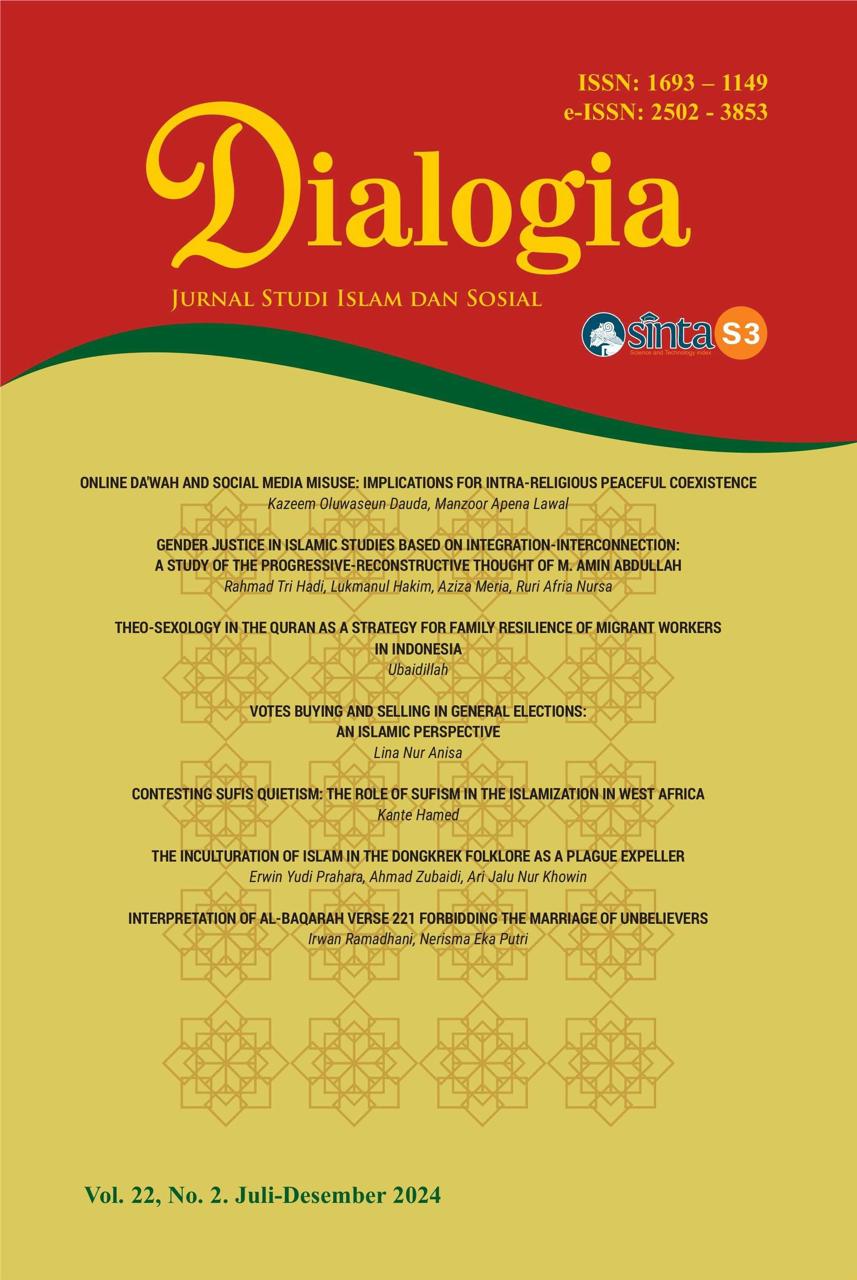Gender and its Relationship with the Development of Islam on Ay Island, Banda Neira
A Socio-Religious Study
DOI:
https://doi.org/10.21154/dialogia.v23i01.10726Abstract
This research aims to analyze the relationship between gender and the development of Islam on Ay Island, Banda Neira, from a socio-religious perspective. The main focus of this research is the role of men and women in religious life, Islamic education, and their involvement in socio-religious practices. This research uses a quantitative method with a correlational approach. Data were obtained through surveys, interviews, participatory observation, and document analysis of the history of Islamic development on Ay Island. The results show that there are differences in participation between men and women in various socio-religious aspects. In religious leadership, 85% of formal positions are still dominated by men, while women are more active in informal Islamic education such as pengajian and madrasah, with 72% of community-based activities managed by women. However, only 35% of women hold leadership positions in formal socio-religious organizations. In addition, 64% of women feel they have limited access to large-scale religious activities, although 78% of communities have shown increased acceptance of women's active role in socio-religious activities. The implications of this study show that although Islam on Ay Island provides space for women's participation, there are still gaps in access and formal leadership. Therefore, efforts are needed to increase women's involvement in wider religious activities through more inclusive policies and strengthening women's capacity in leadership. The results of this study contribute to the understanding of gender dynamics in coastal Muslim communities and provide insights for academics and policy makers in developing Islam-based gender empowerment strategies.
REFERENCES
Aldi, Muhammad, and Ahmad Barizi. “Filsafat Ilmu Dalam Perspektif Budaya Alam Minangkabau: Membangun Kearifan Lokal Untuk Pengembangan Pengetahuan.” Teaching and Learning Journal of Mandalika (Teacher) e-ISSN 2721-9666 6, no. 1 (2025): 212–21. https://doi.org/10.36312/teacher.v6i1.4124
Aldi, Muhammad, and Akhmad Nurul Kawakib. “Reconstruction of Islamic Education Philosophy in Minangkabau Customary Values: Actualizing the Principles of Adat Basandi Syarak, Syarak Basandi Kitabullah.” JIIP-Jurnal Ilmiah Ilmu Pendidikan 8, no. 2 (2025): 1548–57. https://doi.org/10.54371/jiip.v8i2.6902
Aldi, Muhammad, and Retisfa Khairanis. “The Synergy of Religion and Malay Culture in Improving the Empowerment of Islamic Communities Towards Achieving SDGS.” PERADA 7, no. 2 (2024). https://doi.org/10.35961/perada.v7i2.1758
Aldi, Muhammad, and Moh Toriquddin. “History of Thought Syuhudi Ismail: A Study of Textual and Contextual Analysis of Prophetic Hadiths.” J-CEKI: Jurnal Cendekia Ilmiah 4, no. 2 (2025): 1723–32. https://doi.org/10.56799/jceki.v4i2.7141
Berryman, Alex J, Andrew J Spencer, Puja Sharma, and James A Eaton. “A Taxonomic Revision of Banda Myzomela Myzomela Boiei (S. Müller 1843), Including the Description of a New Species from Babar Island, Indonesia.” Bulletin of the British Ornithologists’ Club 145, no. 1 (2025): 35–48.
Elnour, Ahmed AM. “Breast Cancer-the-State-of-the Art in the World and Islamic Development Banks Members Countries (IsDB-MCs).” In Gum Arabic and Breast Cancer Biology: Biotechnology Perspective, 169–213. Springer, 2025.
Elnour, Ahmed AM, Nureddin Ashammakhi, and El Bashier Sallam. “Opportunities for Investing in Organ-on-a-Chip (OoC) Technology, Breast-on-a-Chip (BoC) as an Example Technology Transfer into Islamic Development Bank Members Countries (IsDB-MCs).” In Gum Arabic and Breast Cancer Biology: Biotechnology Perspective, 239–81. Springer, 2025.
Endendijk, Joyce J, and Christel M Portengen. “Gender and Gender Roles in Family Relationships.” In Research Handbook on Couple and Family Relationships, 121–35. Edward Elgar Publishing, 2025. https://doi.org/10.4337/9781035309269.00017
Griliches, Zvi. “The Search for R&D Spillovers.” National Bureau of Economic Research Working Paper Series, no. w3768 (1991).
Hasibuan, Kalayo, Khairul Fadly, and Wahyu Suhendra Waruwu. “The Role of Islamic Educational Curriculum in Shaping the Character of Muslim Generations.” Innovative: Journal Of Social Science Research 5, no. 1 (2025): 1103–9. https://doi.org/10.31004/innovative.v5i1.17274
Hayat, Khizar, and Ahmad Hassan Khattak. “PUNISHMENT FOR MUSLIM SPIES IN ISLAM AND THE OPINIONS OF ISLAMIC JURISTS: A RESEARCH-BASED ANALYSIS.” Sociology & Cultural Research Review 3, no. 01 (2025): 1107–34.
Mappasanda, Rante, Hisban Thaha, and Muhammad Guntur. “Holistic Approaches to Religious Education Management in Madrasah Aliyah Negeri.” International Journal of Asian Education 6, no. 1 (2025): 87–99. https://doi.org/10.46966/ijae.v6i1.465
Muammar. “Gender, Sexuality and Islam in Contemporary Indonesia: Queer Muslims and Their Allies: By Diego Garcia Rodriguez, London, Routledge, 2023, 234 Pp.,£ 31.99 (Ebook), ISBN 978-1-003-30249-0,” 2025. https://doi.org/10.1080/14616742.2024.2441342
Nazari, Sareh. “Workplace Experiences of Muslim Women in STEM in Canada: An Intersectional Qualitative Analysis.” Sex Roles 91, no. 2 (2025): 1–23.
Rashid, Amber Gul, and Zaheeruddin Asif. “Gender Inequality in the Public Sphere as Perceived by Muslim Female Graduate Students at a Pakistani Higher Education Institution–a Critical Grounded Theory Perspective.” Journal of Islamic Marketing 16, no. 2 (2025): 668–88. https://doi.org/10.1108/JIMA-11-2023-0355
Rhouni, Raja. “Fatema Mernissi, the Demon of Coloniality and Decolonial Exorcisms.” Moroccan Thought, 2025, 476. https://doi.org/10.1163/9789004519534_019
Rinaldi, Kailey, Monica Messer, Ardis Hanson, and Janet Chan. “Utilization of Backward Design in Health Professional Education: A Rapid Review.” Journal of Professional Nursing, 2025. https://doi.org/10.1016/j.profnurs.2025.02.004
Safeer, Aqsa Kiran, Atiqa Kanwal, and Hafsa Maria Adeel. “A Critical Exploration of Gender Dynamics in The Beauty of Your Face by Sahar Mustafah: Islamic Feminism Perspective.” The Critical Review of Social Sciences Studies 3, no. 1 (2025): 1575–84. https://doi.org/10.59075/ywa34a93
Suryadi, Nanda, Muhamad Albahi, Norman Gisatriadi, and Sulaiman Musa. “Shariah Governance, Reputation and Customer Loyalty at Islamic Banks.” INVEST: Jurnal Inovasi Bisnis Dan Akuntansi 6, no. 1 (2025): 1–11. https://doi.org/10.55583/invest.v6i1.1189
Uddin, Kazi Ashraf. “Conducting Transgender Research with Rohingya Hijra Participants: Reflections on Methodological and Ethical Considerations.” Development in Practice, 2025, 1–18. https://doi.org/10.1080/09614524.2025.2474045
Zutu, Juliana. “Understanding Gender-Based Violence Responses During Emergencies and Disasters in Solomon Islands,” 2025.
Downloads
Downloads
Published
Issue
Section
License
Copyright (c) 2025 Muhammad Aldi, Retisfa Khairanis, Sulthan Al Aziz

This work is licensed under a Creative Commons Attribution-NonCommercial-ShareAlike 4.0 International License.
Dialogia : Jurnal Studi Islam dan Sosial allow the author(s) to hold the copyright without restrictions and allow the author(s) to retain publishing rights without restrictions, also the owner of the commercial rights to the article is the author.










